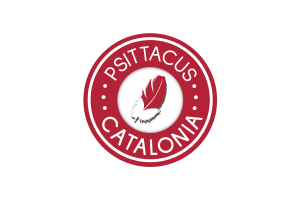PROYECTO
NYMPHICUS
HOLLANDICUS
NYMPHICUS
HOLLANDICUS
Desarrollo de nuevos protocolos de incubación artificial y cría manual para Nymphicus hollandicus
ÁMBITO DEL PROYECTO: Avicultura y conservación
ENTIDADES COLABORADORAS
LUGAR DE REALIZACIÓN DEL
PROYECTO
PROYECTO
PROPUESTA
Marzo de 2022
Marzo de 2022
Sede de Psittacus Catalonia en Sant Antoni de Vilamajor. Instalación de nursería dedicada a proyectos de la Fundación.
PUBLICACIÓN
(pendiente)
(pendiente)
LUGAR DE REALIZACIÓN DEL PROYECTO
Sede de Psittacus Catalonia en Sant Antoni de Vilamajor. Instalación de nursería dedicada a proyectos de la Fundación.
PROPUESTA
Marzo de 2022
PUBLICACIÓN
(pendiente)
(pendiente)
ESTADO DEL PROYECTO
ESTADO DEL PROYECTO
1
Propuesta a confirmar
2
Análisis preliminares
3
Planificación y diseño
4
Realización
5
Análisis e interpretación de resultados
6
Publicación de resultados
1
Propuesta a confirmar
2
Análisis preliminares
3
Planificación y diseño
4
Realizacións
5
Análisis e interpretación de resultados
6
Publicación de resultados
ANTECEDENTES
Pese a tratarse de una especie muy común en cautividad, las ninfas son especialmente difíciles de criar manualmente cuando esto se hace desde edades muy tempranas.
Acotar el porqué de esta dificultad y definir un protocolo de cría manual exitoso, puede dar lugar a conocimientos aplicables a especies más «valiosas» desde el punto de vista de su grado de protección.
De la misma manera, la definición de un correcto protocolo de incubación artificial para esta especie, puede constituir una fuente de información aplicable a otras especies, especialmente cacatúas.
De la misma manera, la definición de un correcto protocolo de incubación artificial para esta especie, puede constituir una fuente de información aplicable a otras especies, especialmente cacatúas.
OBJETIVOS
Este proyecto pretende definir los protocolos de incubación artificial y de cría manual para esta especie. En especial pretende dar solución a la dificultad que supone la cría manual de esta especie desde edades tempranas.
RESULTADOS ESPERADOS
- Maximización del porcentaje de eclosión de los huevos fértiles
- Maximización del porcentaje de viabilidad de los polluelos nacidos
- Maximización de los ratios de crecimiento, calidad del emplume y talla final de los polluelos
PLANTEAMIENTO
Para la realización de este estudio, se cuenta con huevos proporcionados por el centro de cría «Ocells.net» y que son extraidos de los nidos el mismo día de la puesta. La herramienta básica para la definición del nuevo protocolo de incubación artificial son las incubadoras DISRUPTIVE de Psittacus Catalonia. Así mismo, se utilizan prototipos de criadora DISRUPTIVE para las primeras fases de desarrollo de los polluelos. Los polluelos se alimentan en base a dos papillas de la marca PSITTACUS: Psittacine Crop Milk durante los primeros días de vida y Mini Hand Feeding Formula en adelante.
VALORACIÓN GENERAL
Los datos obtenidos en 2022 se consideren insuficientes y se opta por continuar el estudio el 2023.
